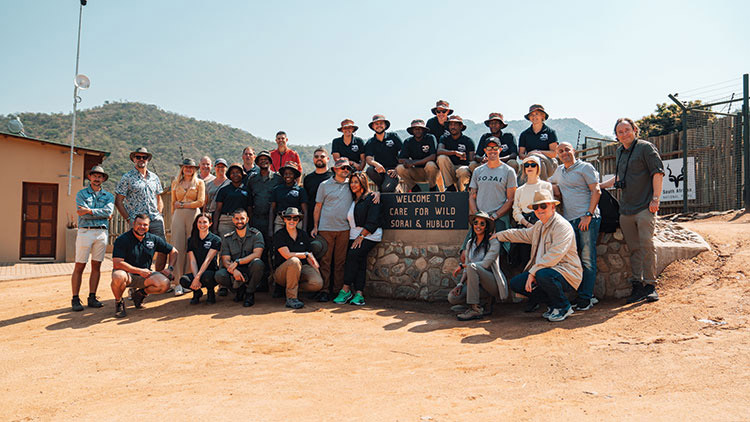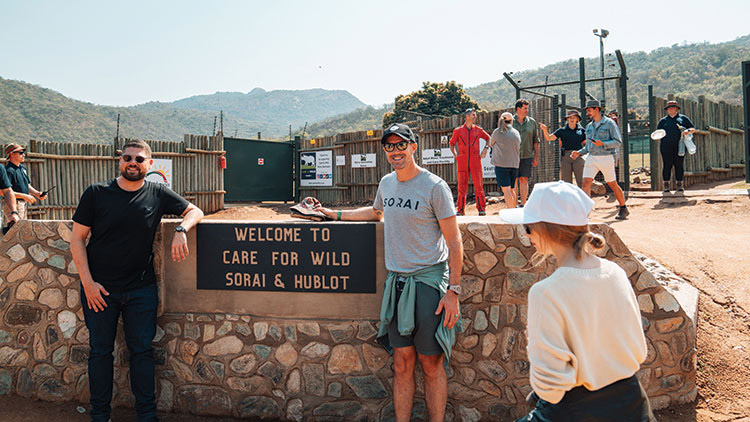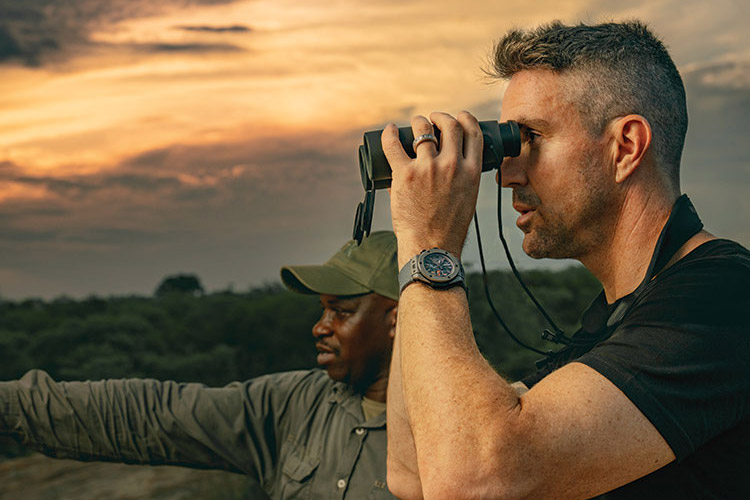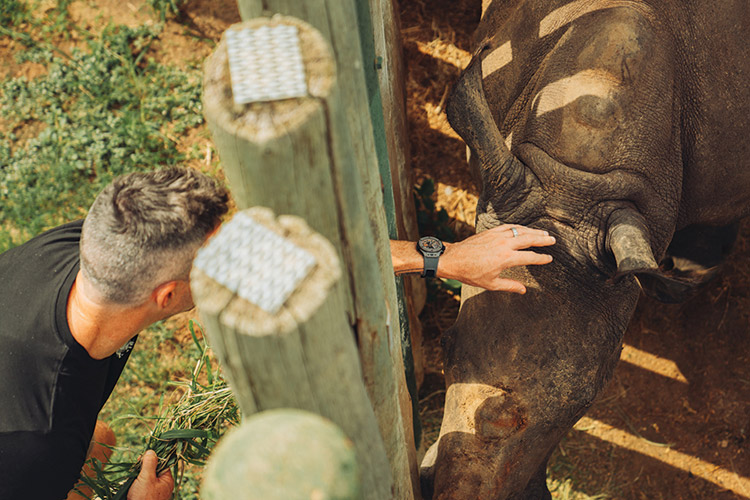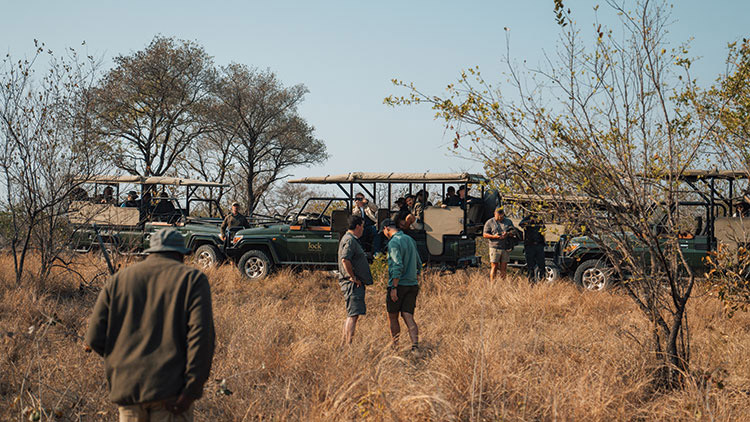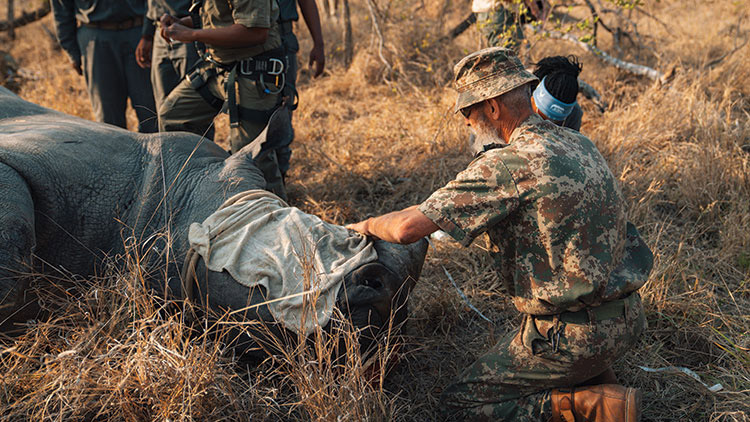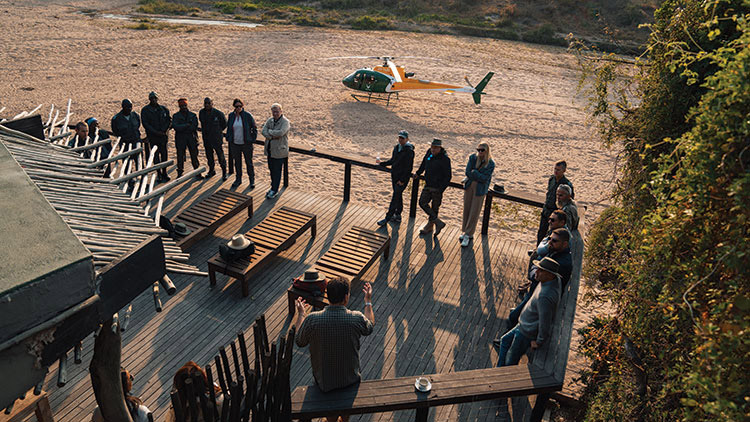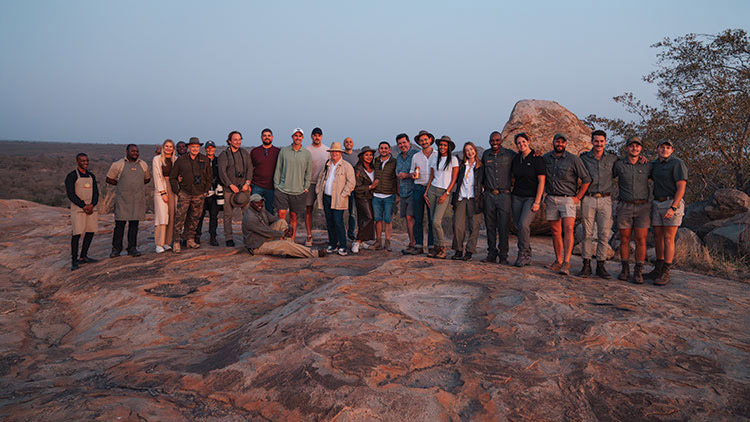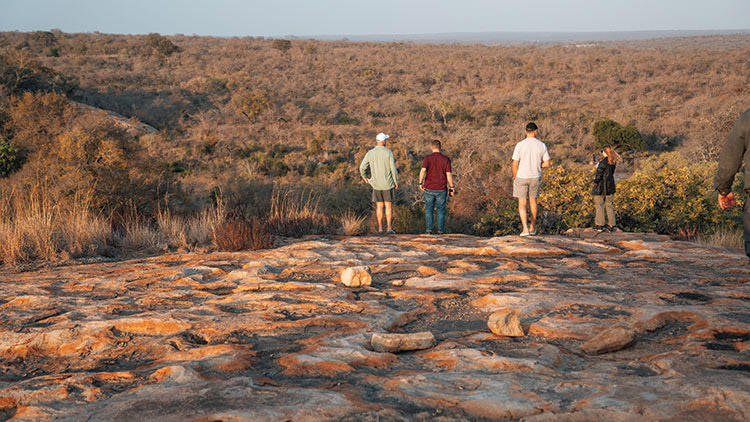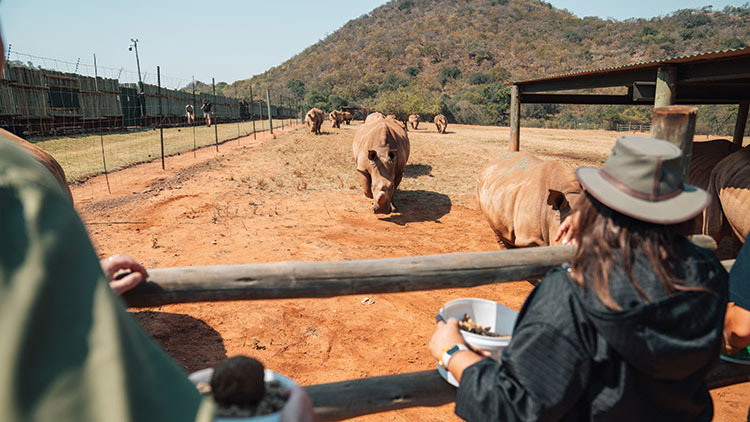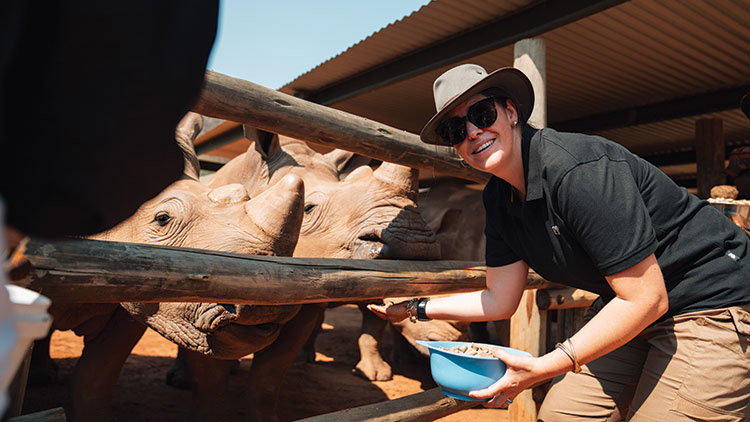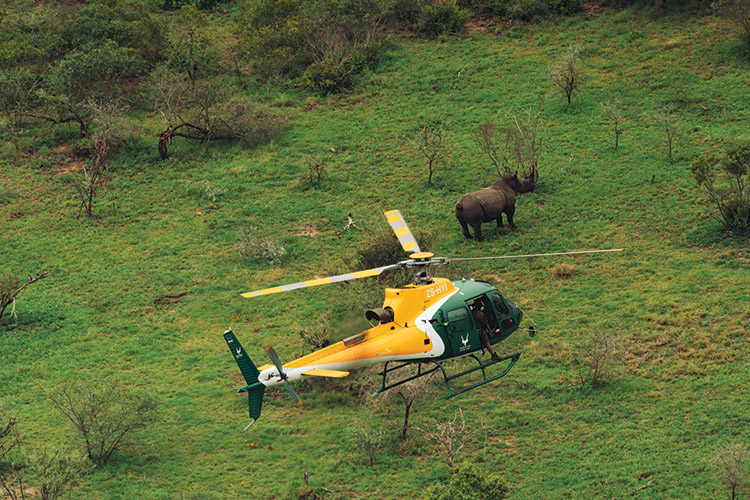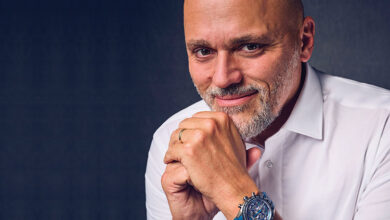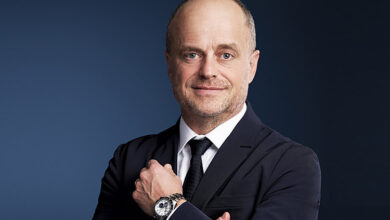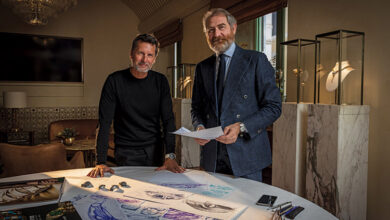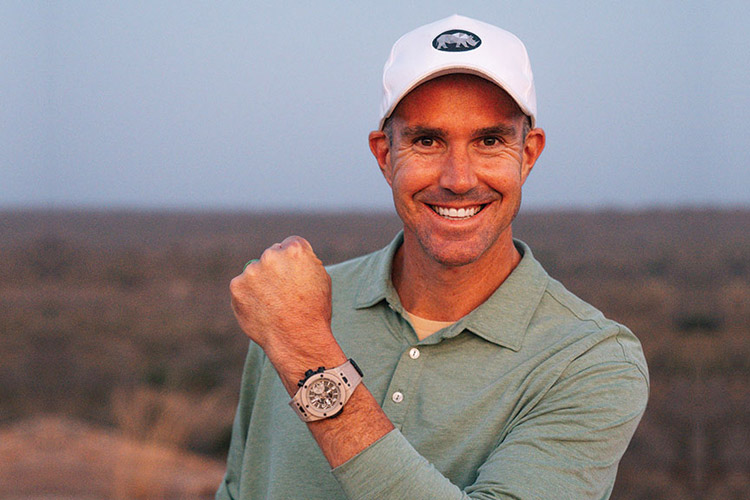
Luxury watchmaker Hublot recently hosted an exclusive curated trip for a select few journalists from across the world at the Kruger National Park, along with SORAI and Hublot Brand Ambassador Kevin Pieterson. We sat down with Kevin, Founder of SORAI, to understand the reasons behind Kevin’s establishment of SORAI and his extensive collaboration with Hublot over the past four years
How did you come to be a rhino conservationist; what started you on this journey?
It all started in 2013, when I first began to learn about what is happening with the species and the destruction of the animal. I was told that a rhino is killed every 8 hours; I studied this issue more closely and did my research and had to finally believe those numbers even though it is very shocking. I am a South African and have been living here for more than 20 years. You are where you are born; I firmly believe that and so there are these emotional ties to my country. When I saw what was happening, it ignited a fire in my belly, and I decided to use my profile for good.
What happened in 2013?
We were micro-chipping the horns of the rhinos and I asked why we were doing it. I was told that this way we can trace the animal if we catch a culprit with the horn and this will help us prevent poaching or help us prosecute poachers. At that moment, we got a call saying that an elephant had been caught in a snare. So, we took the helicopter and flew over to where the elephant was trapped with this massive snare on its leg. We had to put the elephant to sleep and then remove the snare off its leg and this incident made me passionate about conserving our animals. The burning question then is why is this happening and what does the future look like? I was then told that the future is doomed for the rhinos as in the last 10 years, we have lost 90% of the rhino population. For instance, a few years ago, when I used to come here, I would see rhinos gather here every morning, but this trip – though we have been here for three days now – we are yet to see a rhino.
What difficulties did you face when creating SORAI?
One of our biggest challenges was COVID, maintaining our presence during the pandemic was a huge challenge. We were just surviving as a social enterprise during COVID. The generosity of people around this issue is humbling. The government needs to do more and be proactive; they can implement a total ban on rhino hunting and sale of rhino horns. There are some measures in place already, but I think a complete ban on the trading of rhino horns should be at the forefront of governmental action. Rhinos are one of the Big Five and what is Africa without its animals? Africa is synonymous with animals; it is not famous for technology or construction. Africa is known for its animals and when you think of losing one of its species because of something that can be controlled and stopped, there is a problem.
How do you go about preventing the poaching?
I do not look at this from a confrontational point of view; our holistic view is to try and work with people, to try and help people; to provide emotional support as well as financial support because I don’t think being confrontational or aggressive helps anyone. We haven’t had the opportunity to sit around a table and discuss this at the highest level, but I know other people have had this. I know some wonderful conservationists; I had a brilliant conversation with a gentleman way more knowledgeable than me, and way pushier than me. For me, it is also about learning and understanding issues because there is more than one way to skin a cat and there is more than one issue at play.
We just think that people come here to kill animals, but why do they kill? These are desperate people, undertaking desperate measures. They could be killed, coming into the park so why are they doing it? They are just trying to feed their kids. I saw a National Geographic documentary a few years ago on the rhino here in Kruger National Park. In it, there is one man who said, “I don’t know why you white people are here, spending so much money and taking photos of my food”. And that for us was so profound; that for these people, these animals are their food. There are different ways people look at things, and we have to try and understand the people. We try to look after the people, and I am a huge believer in the human fence. If we create a human fence, then that looks after the animals. We did a documentary in India, at the Kaziranga National Park, where the rhino population is booming. This is because the people in the community understand the benefits of looking after the animal through tourism and the financial benefits brought in by tourists that filter through to the community. There are numerous dynamics at play here.
Is that why SORAI is focused on Africa rather than India at the moment?
Yes, we are focused right here because this is where extinction looms. I don’t think the animal will go extinct because there are enough people to walk around and secure one animal and ensure its survival. But when you see the number of rhinos dying, it is devastating compared to where they were earlier. Right now, we are focused on making a difference here; having been in India and seeing the booming rhino population, there is no need for intervention there. Whereas here, there are fewer rhinos, dehorning is rampant, but we do some systems in place here to prevent this as well as some great people who are doing their jobs wonderfully well.
Forget about all the celebrities who walk around with millions of dollars, these people who work here with a passion, who work for a cause – these are the people who should be on the front page of the newspapers. They should be the biggest celebrities of the world, because of the kind of work they do. These are the people who count, not the celebrity who turns up occasionally to do a charity event. These are the people we know and support; I know their wives and their kids, and I know how dangerous their work is. One of the things that humbled me the most and showed me how shallow was the whole sports scenario was seeing people like these and you understand how serious life can be for them. The parents of these people come out to say goodbye to their children when they go to work and say, “I hope that I see you again tonight.” That is how dangerous these jobs are. All of this makes me realise how shallow the whole international sports scene is, and it makes me feel more rooted and makes me happy to work under the direction of these incredible people.
What is SORAI’s role and how does the organisation operate?
Our role is to fund projects that work on conservation of animals. We fund camera systems and other technology, assist rangers, and we put kids through school. We have a lot of camera traps and through these we are able to catch syndicates coming in and the cameras help us get to them before they get to the animals. Three days ago, the rangers were able to catch poachers when they were dehorning a rhino; sadly, the rhino had already been killed by them.
The Legacy Experience Foundation is a Swiss foundation that works with us. They help us with the cameras; there are so many cameras that have taken pictures of us over the past two days of which none of you are aware of. There is a lot of technology around here that we assist in funding. We fund projects that the pilots are associated with; we put thousands of kids through school every year; you can have a look at our website. We believe in creating change from the bottom up and we educate the kids to create the human fence. I am a big believer in the idea that the next generation is the generation that will make a stand and say, “Hey, that is not right.” I cannot put a plastic bottle in the bin as my daughter will tell me that is a recycling bin.
How do you raise your funds?
We raise funds through events that we have here. We also have wealthy donors who support us. SORAI also has a collaboration with Hublot and Hublot also donates directly to some of these projects. When you are donating in foreign currency in South Africa, the money goes a very long way. One such beneficiary of ours is Care for the Wild; that was one of the direct donations during COVID when things were extremely tough here and that donation was a huge help that let them get through the pandemic. Petronel Nieuwoudt is the Founder and CEO of Care for Wild Rhino Sanctuary, which is an orphanage for rhinos. When you visit tomorrow, you can see the wonderful work they do with animals that have been found either chopped up, or orphaned babies that have been darted after an incident and flown directly to Petronel. There are tens of rhinos there and she just looks after them and gets supported by the same kind of NGOs that support the dehornings and other such techniques.
How was Hublot introduced to SORAI?
It was at the 2019 World Cup Cricket tournament that was held in England; Hublot wanted me to do something for them. 2019 was a stressful time for the animals and the animals were running out of time. When I had a conversation with Hublot, I asked them to hear my proposal and perhaps work out something more than just profiling a cricket tournament; something that could be bigger than the Hublot brand, SORAI, and anything else. “Let’s go save a species”. That got the attention of the Hublot team; they trusted me when I explained what a difference we could make, how far the project could go and the opportunity that exists to save one of Africa’s keystone species.
From what I have been told, the partnership has been very successful; we have done three collaborative watches so far and we are discussing a fourth one now. Last week, we had an initial conversation about the fourth watch; the work continues, and it is an extremely important partnership, based purely on the fact that Hublot can reach areas globally that I could never penetrate in my career. For instance, in China and Vietnam, cricket is not played but Hublot goes straight into the luxury market that exists all over our planet, and that is more important than money. The opportunity to bang the drum in the market where the issue is, that is something that I am always going to be indebted to Hublot for. Ask anyone in the Kruger National Park what their favourite watch brand is and there is only one name: Hublot. We are all grateful to the brand not only for the work they have done, but for their commitment as well. It takes a lot of commitment to be actually as engaged in the issue as Hublot is. It is also a great thing when you can travel out here, spend time in the bush, and wake up to beautiful sunrises. As serious the issue is, it is also an opportunity to show people how beautiful Africa is. It is an awesome partnership.
